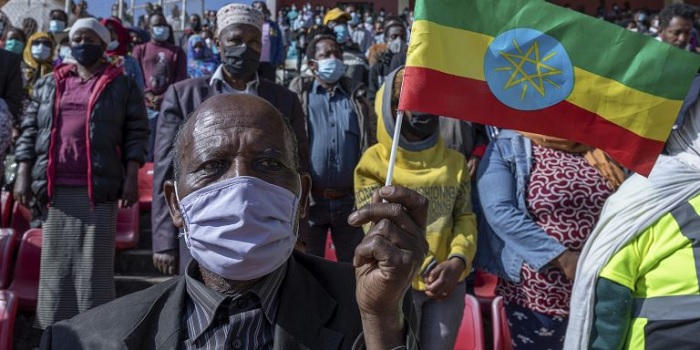
The Ethiopian military has moved swiftly against forces loyal to the Tigrayan People’s Liberation Front in northern Ethiopia, and the escalating conflict is threatening to create a humanitarian crisis in East Africa.
The fighting risks tarnishing the image of Ethiopian Prime Minister Abiy Ahmed, most known for his peacemaking efforts in the region.
The viability of Tigrayan rebels depends on the capabilities of their special forces and whether Tigrayan civilians remain loyal to rebel leaders.
Extra-regional powers are unlikely to intervene in the conflict, although humanitarian actors are working to provide relief to Tigrayan civilians.
The escalating conflict in northern Ethiopia is threatening to create a humanitarian crisis in East Africa and upset a period of relative calm between the countries in the region. Most recently, on November 11, Khartoum reported that 200,000 Ethiopians could soon flee northern Ethiopia’s Tigray region into Sudan. While several thousand Ethiopians have fled to Sudan thus far, the potentially massive refugee flow projected if conflict intensifies would significantly destabilize Sudan at a time when the country is seeking a historic political transition. One of the more interesting aspects of the conflict is that Ethiopia’s Prime Minister Abiy Ahmed was heralded as a peacemaker only last year when he was awarded the Nobel Peace Prize. The 44-year old leader burnished his image by solving the more than 20-year long border standoff between Ethiopia and Eritrea by conceding territory to Eritrea. Specifically, Abiy Ahmed accepted the UN-backed Eritrea-Ethiopia Boundary Commission (EEBC) ruling that awarded the town of Badme to Eritrea.
Until Abiy Ahmed came to power in 2018, the Tigrayan People’s Liberation Front (TPLF) had been part of Ethiopia’s ruling coalition. However, the TPLF did not join Abiy Ahmed’s new Prosperity Party’s coalition in part because Abiy Ahmed, who is of Amhara Christian and Muslim Omoro descent, was willing to part with Badme. This was seen by some TPLF leaders as Ahmed’s ‘selling out’ Tigray, demonstrating that even peace negotiations can have complicated second-order effects. The TPLF, therefore, has resisted the Ethiopian peace deal with Eritrea, including setting up regular border posts around Badme which precludes that deal from being fully enforced. In this context, fighting escalated in early November when TPLF forces appeared to have attacked the Ethiopian Military’s Northern Command headquarters in Tigray and seized weapons. Abiy Ahmed’s government immediately declared a six-month State of Emergency and the Ethiopian Air Force launched airstrikes against TPLF positions around the Tigrayan capital Mekele. Ethiopian forces also seized the airbase in Humera, near the Sudanese border. It appears that the Ethiopian army aims to secure the border with Sudan to prevent TPLF forces from escaping. Likewise, Sudan has deployed soldiers to its border with Tigray to seal the area.
Meanwhile, the conflict is assuming a regional dimension because Eritrea is also shelling Tigray. The elimination or at least submission of the TPLF would allow the peace deal regarding Badme to be enforced again. Although some international organizations are calling for Abiy Ahmed to engage in peace talks with the TPLF, at present it appears the Ethiopian military is intent on a quick and decisive victory. Without any substantive foreign backing and Sudan and Eritrea cooperating with the Ethiopian military, it remains unlikely that the TPLF will be able to resist the Ethiopian military’s incursions for long. If Ethiopia achieves its military objectives as decisively as Abiy Ahmed expects, it will lead to the removal the TPLF leadership and the establishment of a new, cooperative Tigrayan leadership. Abiy Ahmed will further seek to imprison TPLF leaders for rebelling, if not also for allegedly looting banks and other resources during the rebellion.
The outcome of the conflict will hinge in part on the Tigrayan civilian population’s loyalty to the TPLF. Even without civilian support, there are an estimated 250,000 troops between TPLF and local militia fighters, who if they remain loyal to the TPLF leadership, could wage a low-level insurgency for months, perhaps longer. Nevertheless, the Ethiopian military has asserted that some TPLF special forces have already defected from the TPLF. Given how little attention the recent conflict between Armenia and Azerbaijan received in the Western media, it remains unlikely that Western countries or any outside power will intervene in Ethiopia’s military conflict in Tigray. Still, international aid organizations are currently trying to assess needs of the region’s civilians to provide assistance, yet remain hampered by inadequate access to the area. Any American mediation will likely be minimal, given the ongoing U.S. post-election crisis and prioritization of security concerns in Africa related to al-Qaeda and the Islamic State.
 Eurasia Press & News
Eurasia Press & News



